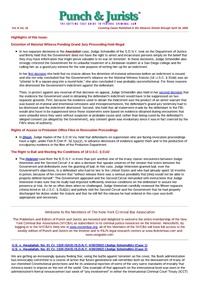Here the Court held that a defendant does not meet the standards for timely "relating back" (under Rule 15 of the Fed.R.Civ.P.) to an original application for collateral habeas relief where attempts to amend a Section 2255 motion under Apprendi raise an entirely new legal claim, arising from a …
U.S. v. Awadallah, 202 F.Supp.2d 55 (S.D.N.Y. 2002) (Judge Scheindlin) (Case 1)
U.S. v. Awadallah, 202 F.Supp.2d 82 (S.D.N.Y. 2002) (Judge Scheindlin) (Case 2)
We are getting an increasingly queasy feeling that, using the battle against terrorism as the cover, the Bush administration has irrevocably committed to a course …
“The Constitution of the United States is a law for rulers and people, equally in war and in peace, and covers with the shield of its protection all classes of men, at all times, and under all circumstances. No doctrine, involving more pernicious consequences, was ever invented by the …
This is the second of two separate decisions by Judge Scheindlin in which she attacked the Government's use of the material witness statute, in this case suppressing evidence on the grounds that the arrest warrant affidavit contained serious misstatements.
U.S. v. Awadallah, 202 F.Supp.2d 55 (S.D.N.Y. 2002) (Judge …
The defendant appealed his jury trial conviction of two counts of being a felon in possession of a firearm. He alleged, inter alia, that the District Court erred in refusing to suppress the physical fruits of a statement obtained in violation of Miranda. On that issue the Fourth Circuit …
Here the Court held that defendants on supervision who are facing revocation proceedings have a right, under Fed.R.Crim.P. 32.1(a)(2), to advance disclosure of evidence against them and to the production of exculpatory evidence.
The defendant in this case was serving a three year term of supervised release (as …
Defendant was sentenced to three years probation after pleading guilty to possession of an unregistered firearm in violation of 26 U.S.C.S. § 5861(d).The Government filed a petition for warrant of summons for offender under supervision, recommending revocation of defendant's term of supervision because he failed to report for drug …
For decades it has often seemed as if Judge Weinstein was one of the few judges who really understood the enormous advantages that the Government achieves by throwing defendants in jail as soon as they are charged with crimes. His conclusions in U.S. v. Gallo, 653 F.Supp. 320 (E.D.N.Y. …
